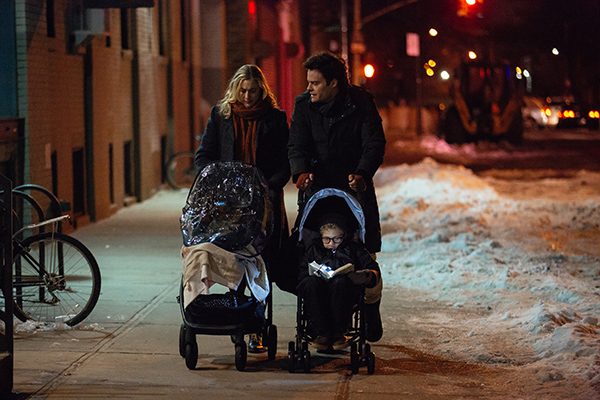

In a film populated by university writers and academics, Maggie’s Plan takes a literary approach as a (romantic) comedy of errors. As the title suggests, the film is a story about the organized and meticulously prepared paths we set out on only to be redirected by the unpredictable and volatile intervention of life. Filmmaker Rebecca Miller translates a story strong in plot structure and thematic content, filling it with rich characters and with a few minor bumps along the way, but with an ultimately satisfying result, while adding another solid film to the repertoire of New York City love stories.
Maggie’s Plan follows the titular Maggie (Greta Gerwig, Frances Ha), a thirty-something art marketer for the New School. After years with little luck in love, Maggie makes a plan to have a baby on her own, using the sperm donation of a former college peer – portrayed in a surprisingly humorous turn from Travis Fimmel (TV’s Vikings). Her plan is derailed, however, when she begins an affair with John, a married professor at the school (Ethan Hawke, Boyhood) who initially seeks her help in writing his first fiction novel. She comes between him and his brilliant academic-wife Georgette (Julianne Moore with a comedically confusing European accent) and years later comes to realize that John and his ex should have stayed together all along. Enlisting the help of Georgette, Maggie concocts a new and convoluted plan to once again rearrange their love triangle.
In terms of story, Maggie’s Plan is a literature lover’s dream. Miller, being a novelist herself (she wrote novel and screenplay for The Private Lives of Pippa Lee), clearly understands plot, character, and thematic development on an expert level, and her script is clever to say the least. For instance, her protagonist Maggie is the only character within the three main players to not be an actual writer. She does, however, work as a creative developer of sorts at the school, helping students to package and market their art to sell in the real world. She does the same thing with John’s writing, and in the grand scheme of the plot, Maggie has the most agency, attempting to figuratively write and control her own life story as well as those around her. The dialogue is slightly weaker than the plot in comparison, having a tendency to be a bit drab and needlessly common – excepting for most of the moments with Moore’s wacky Georgette or those featuring Maggie’s best friends Tony and Felicia (SNL alums Bill Hader and Maya Rudolph).
Possibly as a first for Gerwig, she plays a more subdued character compared to many of the pithy firecracker women she has portrayed in the past (i.e. her idealized Manhattanite character in Mistress America or her entitled woman-child role in Frances Ha). Not to say that Maggie is lacking in verbal wit, she has plenty of it, paired with an eccentric personal style. It manifests, however, in a much more unassuming capacity as she acts the role of the well-intentioned puppet master. Seeing her in a more mature role, approaching motherhood and serious parenting relationships, Gerwig is called upon for a deeper level of vulnerability and emotional performance (more along the lines of her early work in The Dish and The Spoon). Although her charm ultimately shines through, there does seem to be a very slight disconnect between the actress and the character, this being one of the first times she looks to be out of her comfort zone.
Hawke does as fine a job as expected, but John often gets lost in the dominant women playing opposite him. The development of his and Maggie’s relationship is quite refreshing, though, when compared to typical older professor – younger woman scenarios; there is no seduction, but a genuine love built on a psychological and emotional connection, making their affair less tawdry and more reflective of their maturity and shared intelligence.
In the two wildcard roles, Georgette and Guy (Maggie’s sperm donor) bring a decent amount of commendable charisma to the story. Moore as the comic relief is definitely not typical in the actress’ wheelhouse, but she undoubtedly steps up to the challenge. The Oscar-winner even manages to insert humanity into a highly severe and intimidatingly brilliant academic. Guy, although essentially a background character, is one of the most intriguing and well thought out tertiary roles I have yet to see. Fimmel does incredible work with him as well, bringing a quiet and layered humor to a generally miniscule part.
Although Miller creates a great ensemble of characters with rich backstories, they all take somewhat of a backseat to the complex plot and larger themes at hand (the relationship between fate vs. free will and the connection between writing and literal world building, for example). Another of these backgrounded characters is New York itself. Miller deliberately makes the city its very own force within the story, using wide shots and unique camera perspectives to make it seem as though the city is taking an active part in framing the story. The New York City that Miller presents, though, is untypically pedestrian with flat coloring and the use of lesser known locations. Although Manhattan is often used on a more grand scale, these visuals go along with the idea of life and harsh reality interrupting bigger plans, ideals, or expectations. It is a visual juxtaposition to Maggie’s eccentric appearance, and thereby also pushes back against her sense of control. In that regard, the city’s commonplace characterization makes complete sense, but it somewhat misses the mark in creating a visually compelling result.
Verdict: 3 out of 5
Maggie’s Plan is nearly perfect on paper. It has complex, likable characters played by outstanding actors and accompanied by an intriguing and structurally sound plot. Translated onto screen, it still achieves quite a successful result for the creative team of one, Rebecca Miller. However, the marriage of story, character, acting, and visual presentation don’t come together quite as satisfyingly as the script. Although Gerwig, Hawke, and Moore all do their parts to bring vibrant life to Miller’s characters, their potential is somewhat stifled by the overpowering and ambitious story being told.



